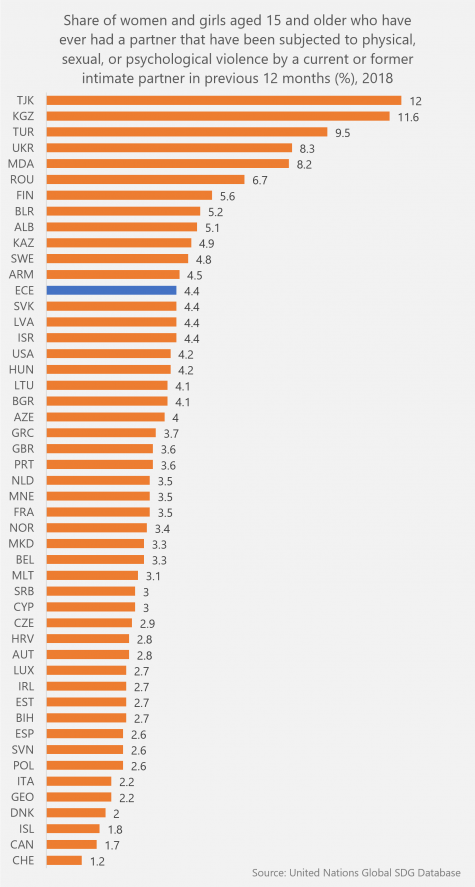
On today’s World Elder Abuse Awareness Day, focused on Gender-Based Violence in Older Age: Policy, Law and Evidence-based Responses, UNECE calls for commitment and concrete measures to end violence against older women in the pan-European region and North America.
A challenge in all regions
Gender-based violence disproportionately affects women and girls. Around the world, social and cultural structures perpetuate an imbalance of power between men and women which makes women more vulnerable to various forms of harm at home and in the public sphere. Gender-based violence can be sexual, physical, verbal, psychological, or socio-economic and can be perpetrated by anyone. Gender-based violence against women impedes gender equality, deprives women and girls of fundamental human rights, and threatens the democratic and economic integrity of societies.
According to the World Health Organisation, 1 in 3 women worldwide are subjected across their lifetime to physical or sexual violence by an intimate partner or sexual violence from a non-partner.
Violence affects women in all countries in the UNECE region. Among women aged 15 and older in the region who have had a partner, 4.4 per cent experienced some form of violence within the previous 12 months, based on population-weighted average for countries with data (2018 - see figure below). While the share of women experiencing violence is low in many countries in the region, there is no acceptable level of violence against women, and country-level figures mask the varied experiences of different population groups.

SDG Target 5.2 calls for the elimination of all forms of violence against women and girls in the public and private spheres (Target 5.2). However, evidence around violence against women and girls remains very limited. Most countries do not collect data on violence against women and girls on a regular basis, and data collection and research on the topic presents unique ethical and practical challenges.
Older women at risk
In several countries, prevalence estimates are based on data from surveys that focus on women of reproductive age, excluding the experiences of older women. The sexist attitudes and power imbalances that enable violence against women become more pronounced with age. Intersecting vulnerabilities mean some older women face a higher risk of experiencing violence, abuse, and neglect. Older women are more likely to face old-age poverty and live alone, making them vulnerable to scams and other forms of financial abuse. Older women are overrepresented in institutional settings, where they face the risk of physical, emotional, and even sexual violence, which continues to occur in older age. Stigma and institutional ageism may prevent older women from reporting violence by caregivers at home. The scarcity of statistical data on violence against older women limits understanding of the issue and the development of evidence-based policies for prevention, protection, and support.
Action at the international and national level
The international community has acknowledged both the need for improved data on violence against older women and policies to address the issue. The 2022 Rome Declaration—which represents a recommitment of UNECE member States to the Madrid International Plan of Action on Ageing (MIPAA) and its Regional Implementation Strategy—urges countries to work toward policy actions that improve the protection of older women from gender-based violence, address all form of violence against older persons, and provide relevant support services, adequate complaint mechanisms, and equal access to justice for older victims of violence.
UNECE member States are taking concrete action to prevent and protect older women and men from violence and to provide access to support and justice when violence occurs. Malta’s National Strategy on Gender based violence and domestic violence (2021-2022) targeted all forms of violence and various awareness-raising campaigns are directed towards older persons. The National Board of Health and Welfare of Sweden has produced a training course on violence against older persons for workers who come into contact with older persons. A ten-year national strategy to prevent and counter men’s violence against women took effect in Sweden in 2017 and covers all ages. In the United States, the Elder Abuse Prevention and Prosecution Act of 2017 is the first federal legislation aimed at improving the criminal justice response to elder abuse, and includes provisions for increasing data collection and information sharing of abuse and fraud cases, increasing training of federal prosecutors and investigators, and establishing elder justice coordinators in each federal judicial court.
Targeted interventions for older women require better evidence. The Rome Declaration emphasizes the widespread and urgent need for age-disaggregated and ageing-relevant data and statistics. Several countries including Norway and Canada have conducted national studies on elder abuse which provide valuable sex-disaggregated information. The recently launched EU survey on gender-based violence against women and other forms of inter-personal violence (EU-GBV) targets women aged 18-74 living in private households. Bulgaria, France, Latvia, Lithuania, Netherlands, Austria, and Slovenia have completed data collection, which will continue in other countries this year. These data are an important step towards filling information gaps on violence against older women, but additional efforts are required to ensure coverage of some of the most vulnerable groups like the very old and those living in institutional settings.
Read more

